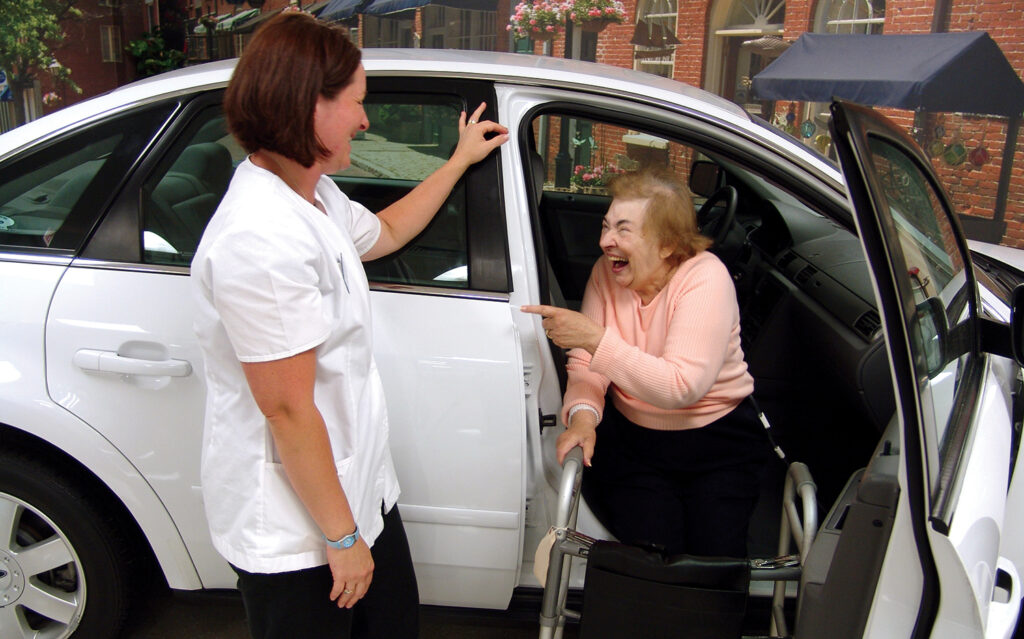Whittier Health Network
Inpatient Acute Rehabilitation Facilities (IRFs)
Whittier Rehabilitation Hospitals’ IRFs give hope to individuals who need intensive acute rehabilitation. Our focus is on improving activities of daily living and functional mobility to increase our patients’ level of independence. Our experienced team utilizes an interdisciplinary, coordinated approach to maximize each patient’s functional independence and facilitate a safe discharge back to their home and community.
With the mission of assisting our patients in maximizing their level of daily function, Whittier Health Network gives hope to individuals who need intensive acute rehabilitation. Unlike acute-care hospitals, our focus is improving activities of daily living and functional mobility to increase our patients’ level of independence. Inpatient Acute Rehabilitation Facility (IRF) treatment usually lasts 12-16 days, depending on your unique needs. Our experienced team utilizes an interdisciplinary, coordinated approach requiring patient participation at least 15 hours per week, usually over six days.
 What makes Whittier’s IRF different from other rehabilitation programs?
What makes Whittier’s IRF different from other rehabilitation programs?
Our interdisciplinary team is led by a physiatrist (a physician specializing in rehabilitation medicine). It includes certified rehabilitation nurses, nurse case managers, social workers, and physical, speech, occupational, and respiratory therapists. Our patients require resource-intensive care in an inpatient setting, receiving 24-hour medical supervision and treatment. This model is recognized as the gold standard in the field of rehabilitation.
IRF By The Numbers
According to the Centers for Medicare and Medicaid Services (CMS), IRF patients have more successful outcomes and discharge home with fewer hospital readmissions, in contrast to other rehabilitation models and settings.
Medicare/Medicaid’s IRF care and commercial insurance criteria are stringent and specific, which results in the rates of patients being successfully discharged home from an IRF setting being demonstrably higher than those of patients discharged from skilled nursing facilities (SNFs). The readmission percentage within 30 days of discharge for IRFs is 4.7%, compared to 6.1% for SNFs. The rates of patients going home from IRFs (76%) versus SNFs (40%) illustrate the phenomenal success of intensive therapy and medical services, motivating and inspiring patients and the professionals who care for them. Read more about the Centers for Medicare & Medicaid Services coverage requirements here.
Recovery success at Whittier’s IRFs
We know the little things matter most during recovery. For the patient re-learning activities of daily living, the small victories lead to larger ones: picking up a spoon to eat independently can lead to higher-level tasks like cutting food or preparing a meal. Therapy that starts with simply raising one’s arms, or sitting on the edge of the bed, can progress to retrieving a can of soup or standing unassisted. Patients also practice more complex maneuvers, such as walking up and down stairs, preparing a meal, or transferring in and out of a car. Whittier’s therapists are here to celebrate the patient’s progress, motivating them every step of the way.
Much more than physical therapy
When referred patients come to one of our Inpatient Rehabilitation Facilities, they have various impairments. While our skilled therapists focus on regaining function so patients can live as independently as possible, Whittier IRFs offer an expert medical team to tailor patient programs to their specific medical and rehabilitation needs.
Patients with acute or chronic illnesses receive additional support concurrent with therapies for functional requirements. For this reason, IRFs in Bradford and Westborough are licensed in the state of Massachusetts the same as the typical community hospital, which renders care for acute conditions.
Whittier is proud to be one of the first hospitals in the country to have been granted dual certification as LTAC (Long Term Acute Care) and IRF. This allows us to treat all patients regardless of the level of rehabilitative care they require or qualify for under medicare guidelines. We can tailor each of our patients’ rehabilitation programs to improve progression toward their goals so they may get back to their previous lives.
Our on-staff and consulting physicians come from various specialties: physiatry, neurology, cardiology, pulmonology, and mental health, along with other supporting medical consultants. Hospitalists manage day-to-day medical needs and treatments in collaboration with the physiatrist and the rest of the IRF team.
Candidates for IRF treatment include the following diagnoses (but are not limited to):
- Stroke/Cerebral Vascular Accident (CVA) recovery
- Traumatic Brain Injuries (TBI)
- Wound management
- Neurological conditions
- Post-op orthopedic surgeries
- Generalized weakness/deconditioning
- Post-op management for organ transplants
- Spinal cord injuries
- Pulmonary conditions and management
What you can expect from Whittier’s intensive rehabilitation facilities
Whittier is here to help patients succeed. Patients and family members can rest assured Whittier will provide therapy 5-6 days per week, with at least three hours of intense daily rehabilitation. Patients will also receive prudent management of chronic conditions like diabetes or heart disease, high-quality nutritional support, and assistance with personal care.
During inpatient stays with us, patients and families become an active part of the team and assist us in goal setting for rehabilitation and decision-making for discharge planning. Patients and families are active participants along the journey and critical to their progress. We embrace collaboration in our day-to-day family teaching of new skills and our team meetings to ensure families and patients stay well informed.
Each patient’s course of recovery is unique. The duration of rehabilitation is determined by the severity of the patient’s condition, their potential for improvement, and their response to treatment. The ultimate goal of our team at Whittier is to maximize each patient’s functional independence and facilitate a safe discharge back to their home and community.

